Surah Ghafar
Contents
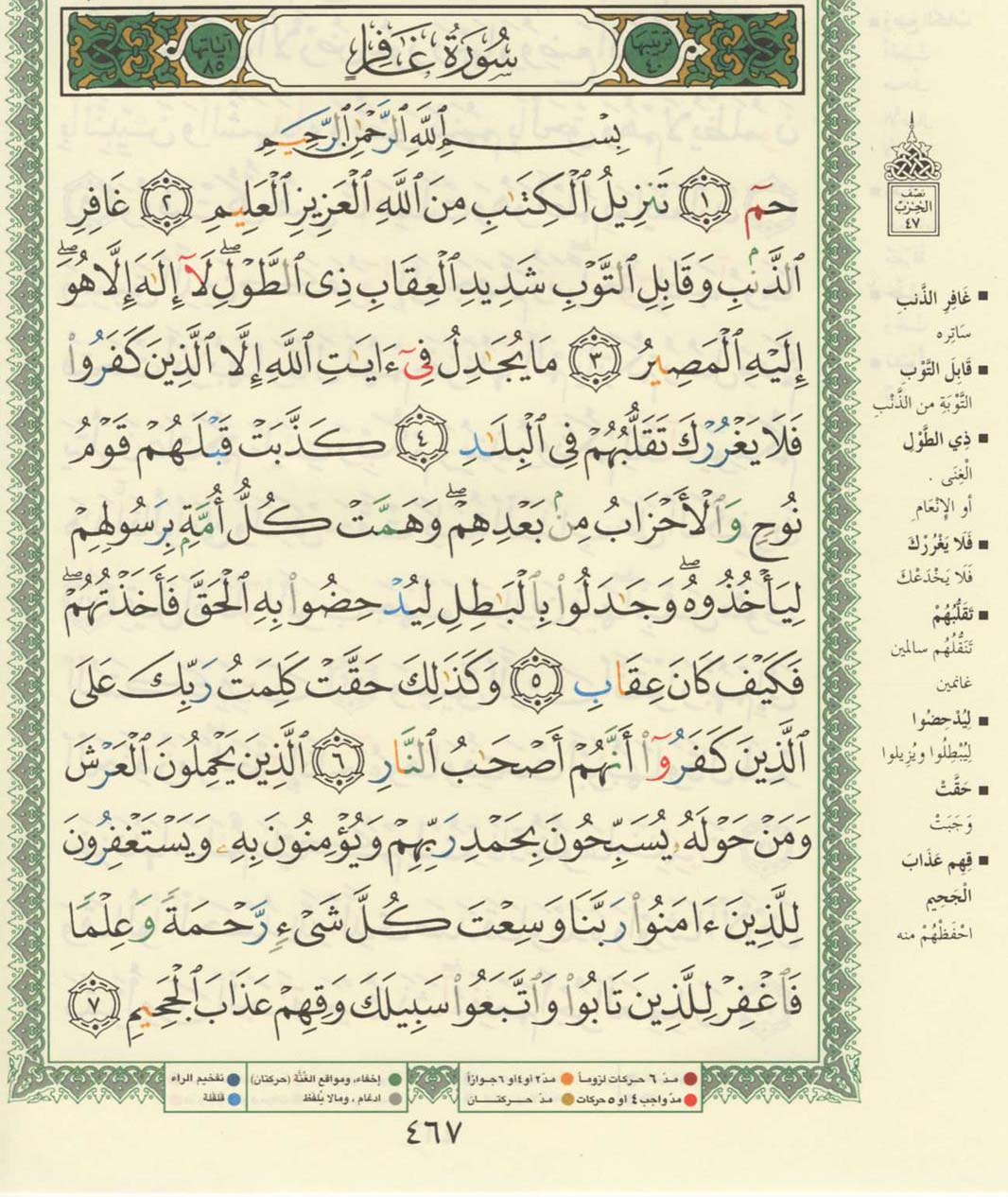
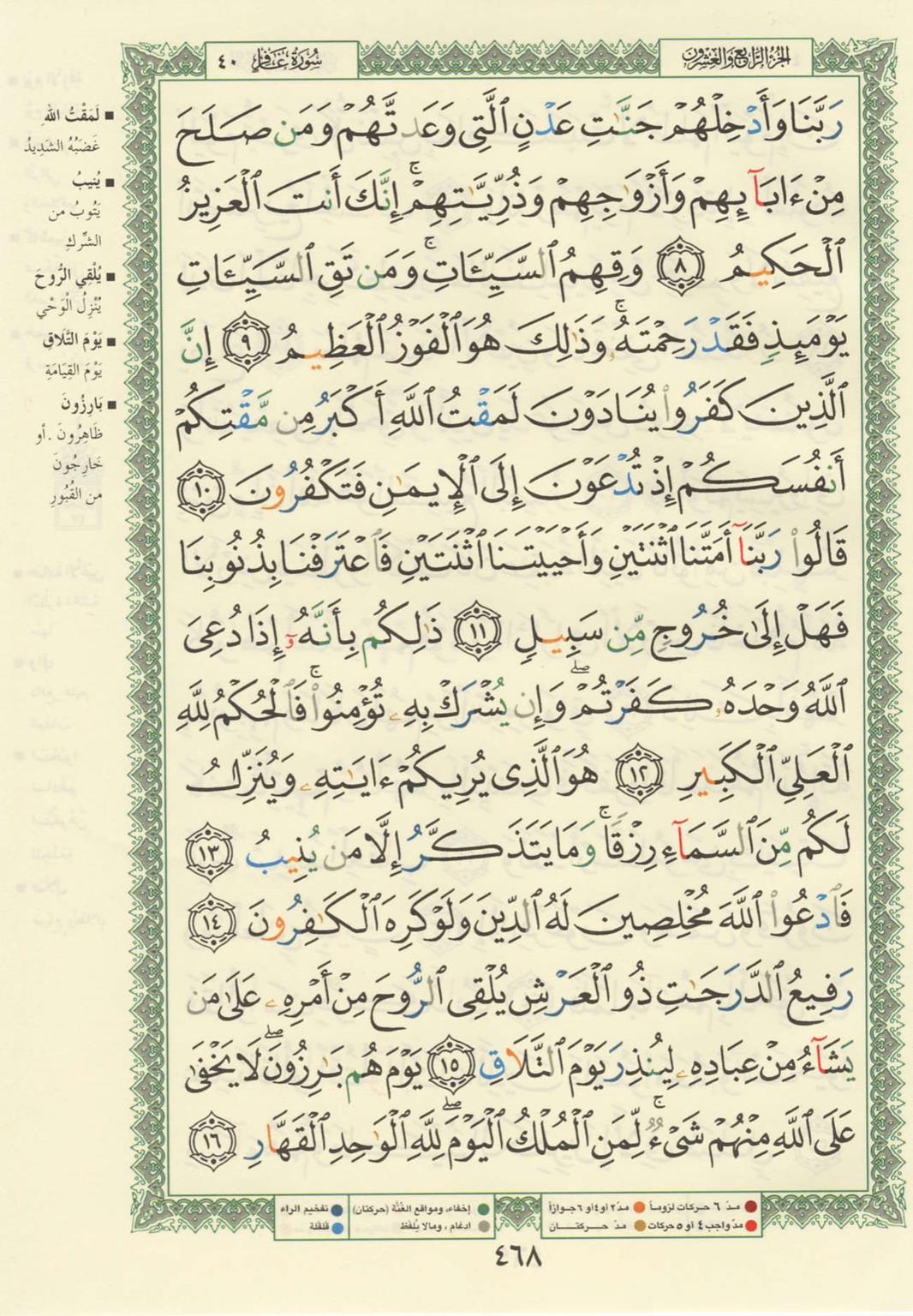

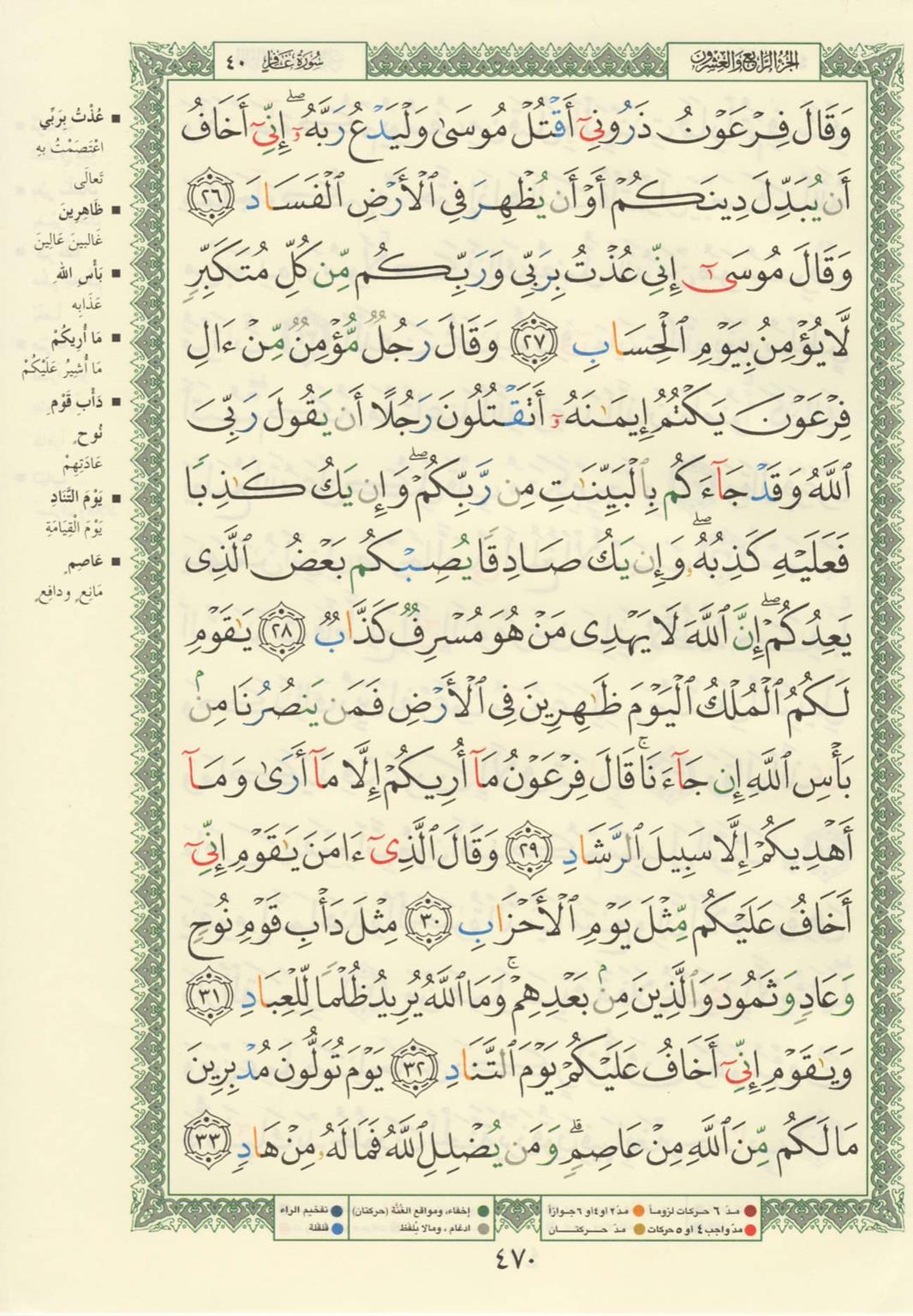
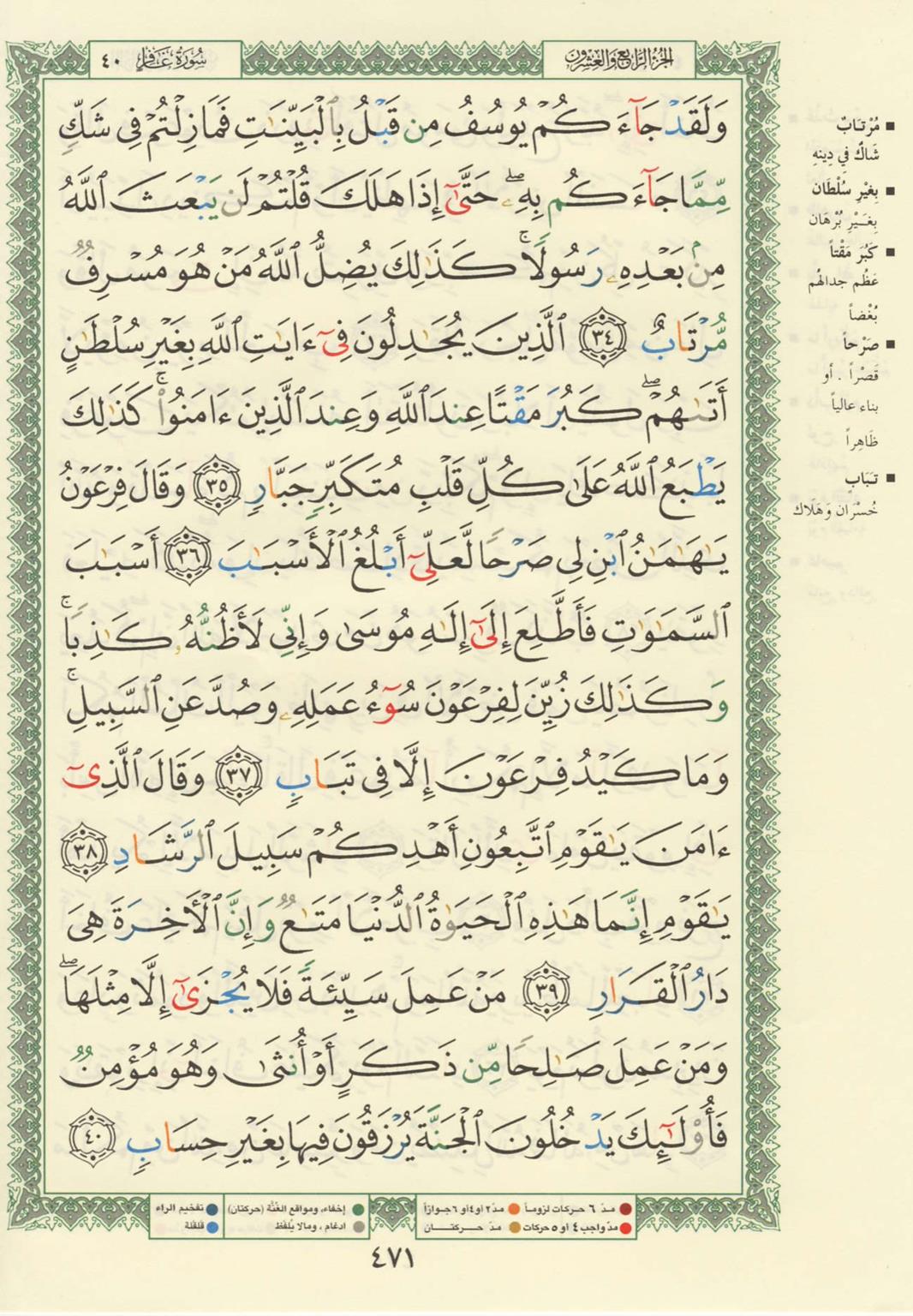
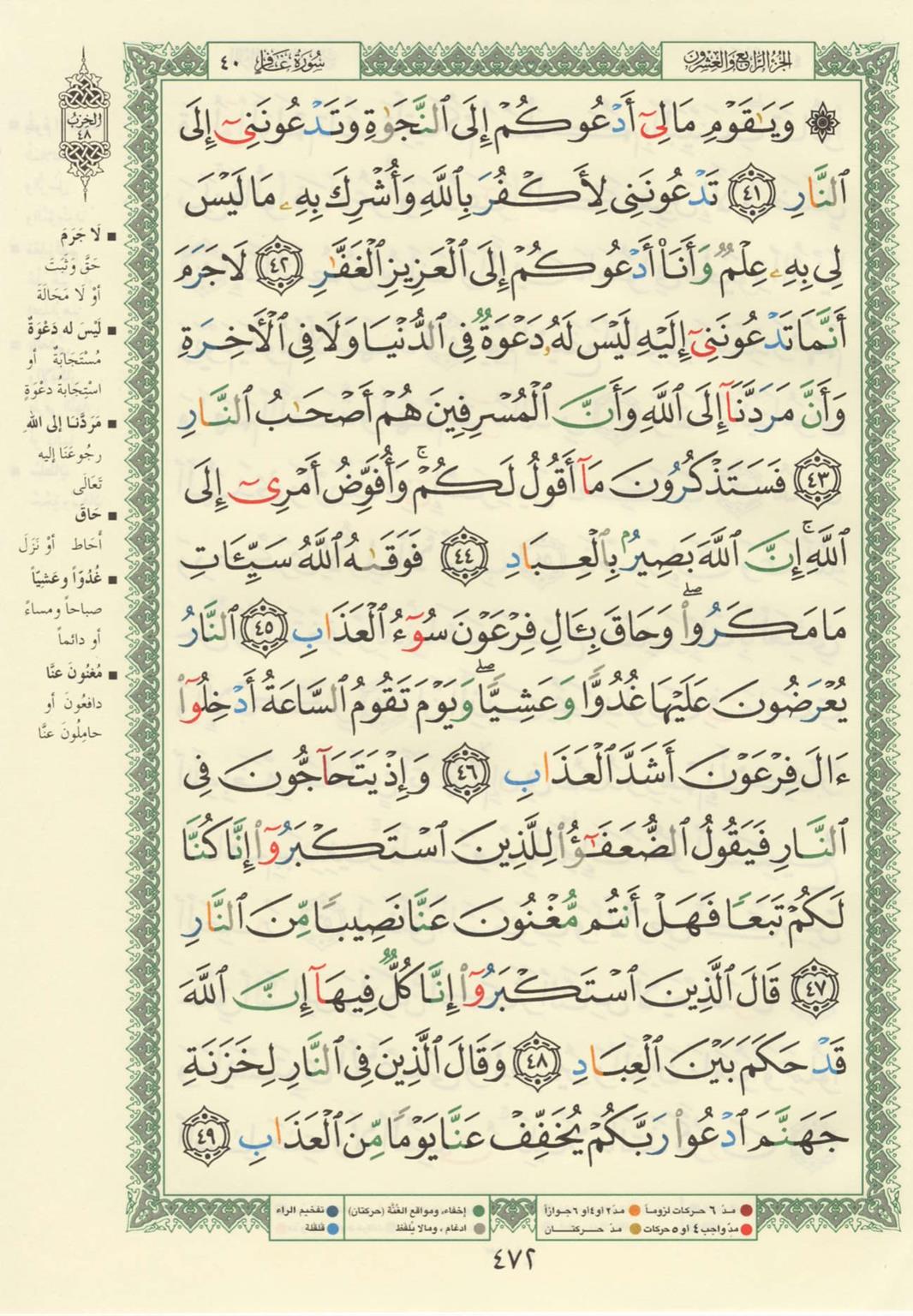
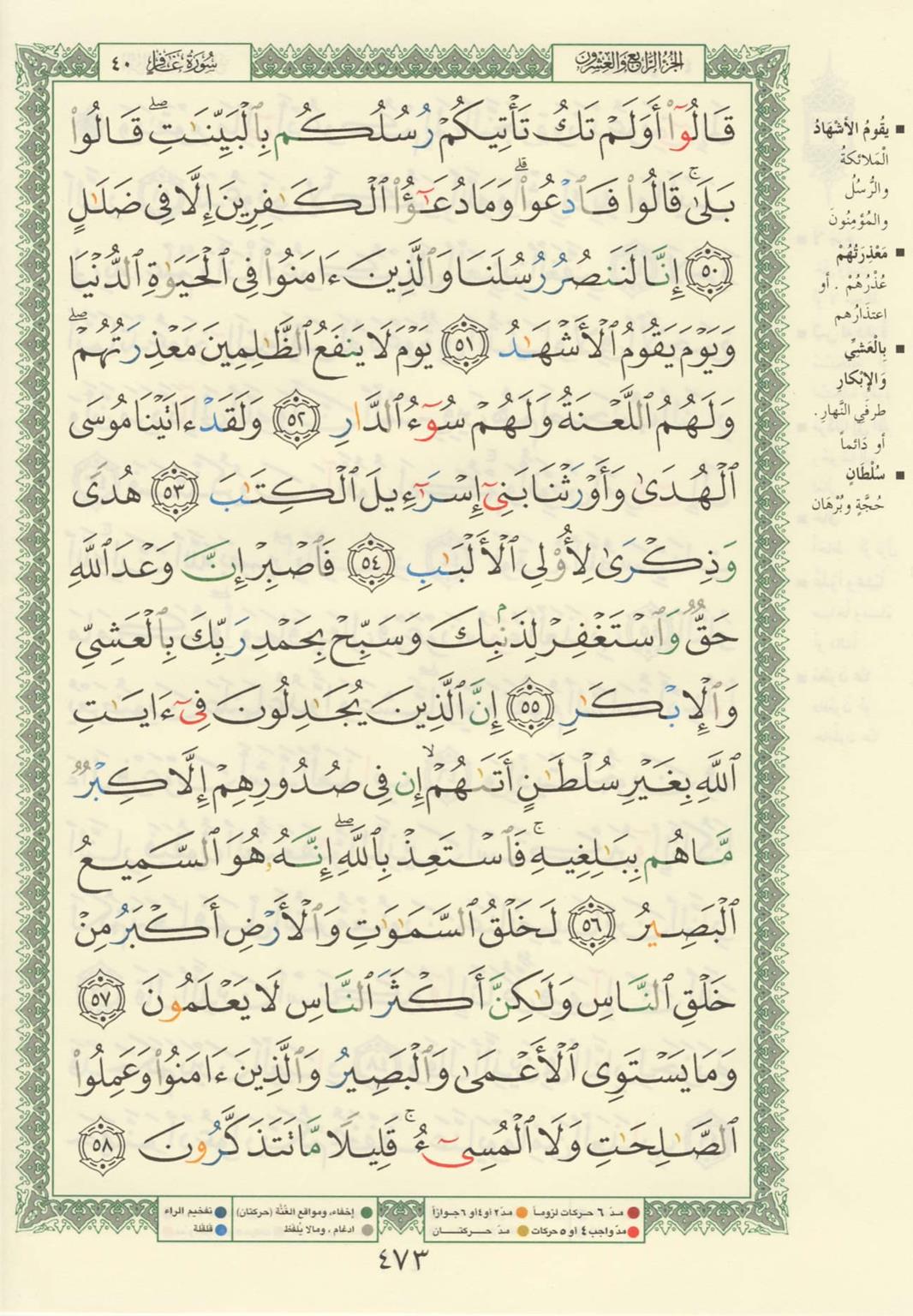
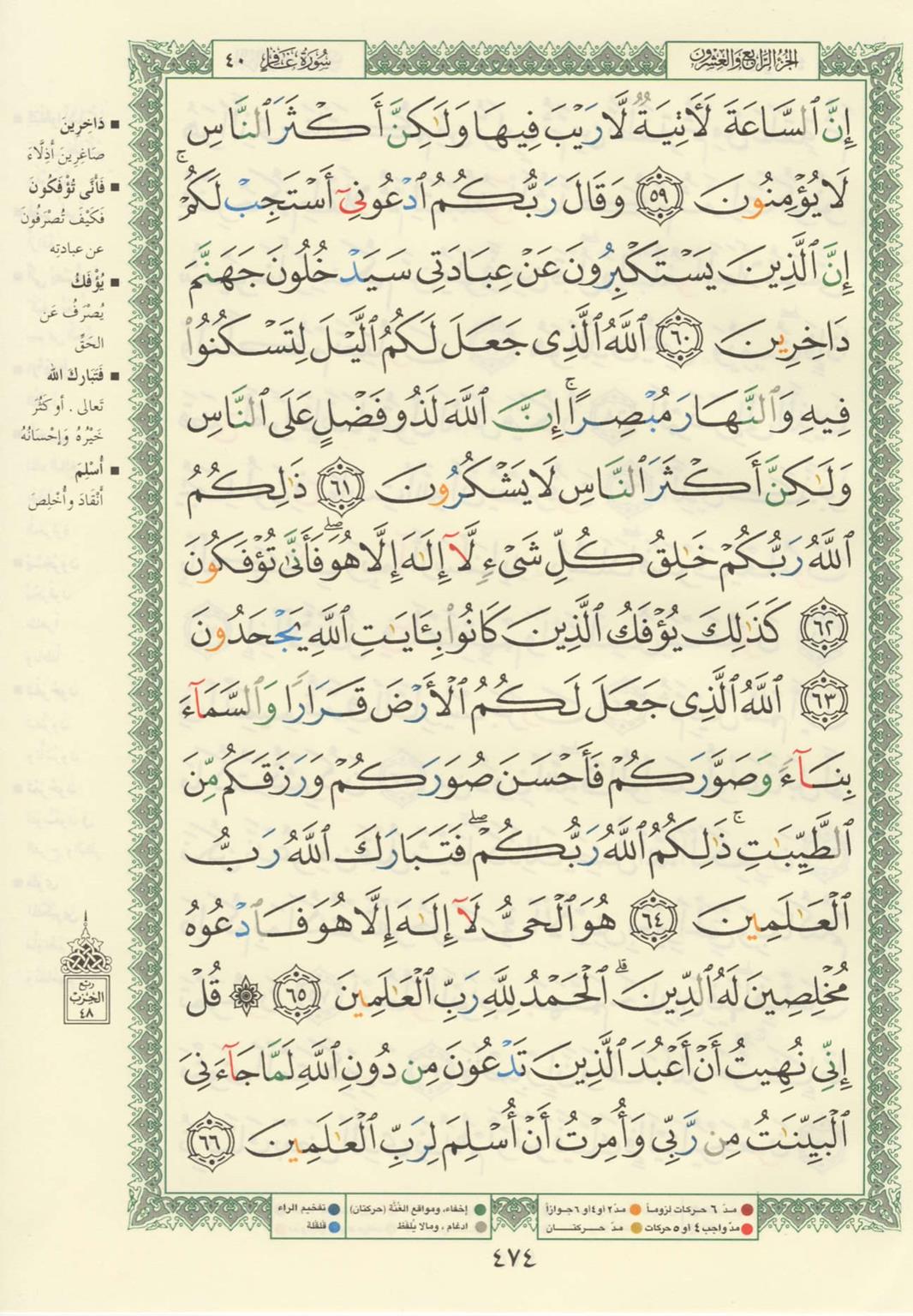
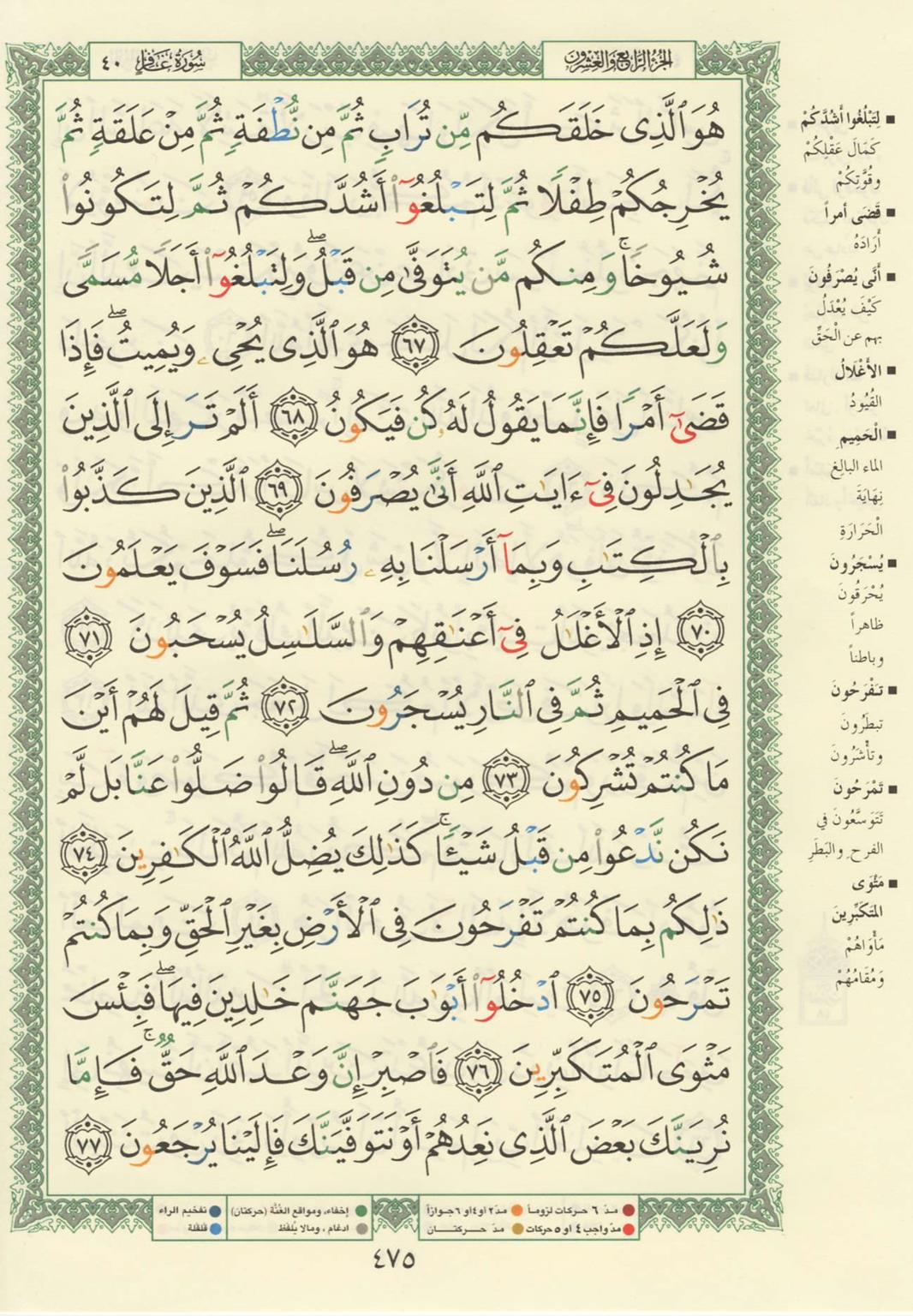
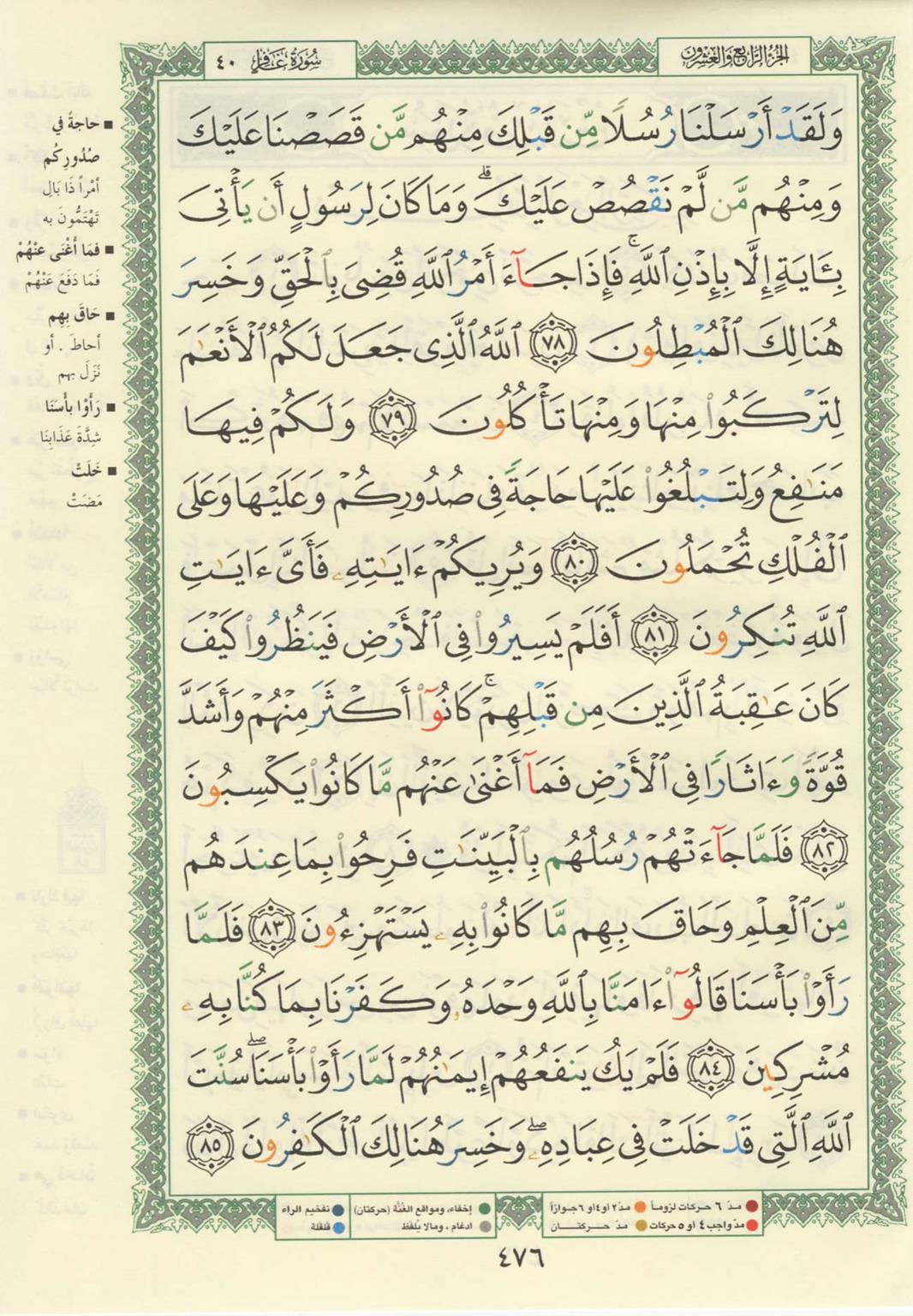
Page 467
40:1
ح-م
![]() حمٓ
حٰمٓ
hha-meem
Ha Meem.
حمٓ
حٰمٓ
hha-meem
Ha Meem.
40:2
ن-ز-ل
![]() تَنزِيلُ
تَنْزِیْلُ
tanzīlu
(The) revelation
تَنزِيلُ
تَنْزِیْلُ
tanzīlu
(The) revelation
ك-ت-ب
![]() ٱلۡكِتَٰبِ
الْكِتٰبِ
l-kitābi
(of) the Book
ٱلۡكِتَٰبِ
الْكِتٰبِ
l-kitābi
(of) the Book
م-ن
![]() مِنَ
مِنَ
mina
(is) from
مِنَ
مِنَ
mina
(is) from
ا-ل-ه
![]() ٱللَّهِ
اللّٰهِ
l-lahi
Allah
ٱللَّهِ
اللّٰهِ
l-lahi
Allah
ع-ز-ز
![]() ٱلۡعَزِيزِ
الْعَزِیْزِ
l-ʿazīzi
the All-Mighty,
ٱلۡعَزِيزِ
الْعَزِیْزِ
l-ʿazīzi
the All-Mighty,
ع-ل-م
![]() ٱلۡعَلِيمِ
الْعَلِیْمِ
l-ʿalīmi
the All-Knower.
ٱلۡعَلِيمِ
الْعَلِیْمِ
l-ʿalīmi
the All-Knower.
40:3
غ-ف-ر
![]() غَافِرِ
غَافِرِ
ghāfiri
(The) Forgiver
غَافِرِ
غَافِرِ
ghāfiri
(The) Forgiver
ذ-ن-ب
![]() ٱلذَّنۢبِ
الذَّنْۢبِ
dh-dhanbi
(of) the sin,
ٱلذَّنۢبِ
الذَّنْۢبِ
dh-dhanbi
(of) the sin,
ق-ب-ل
![]() وَقَابِلِ
وَقَابِلِ
waqābili
and (the) Acceptor
وَقَابِلِ
وَقَابِلِ
waqābili
and (the) Acceptor
ت-و-ب
![]() ٱلتَّوۡبِ
التَّوْبِ
l-tawbi
(of) [the] repentance,
ٱلتَّوۡبِ
التَّوْبِ
l-tawbi
(of) [the] repentance,
ش-د-د
![]() شَدِيدِ
شَدِیْدِ
shadīdi
severe
شَدِيدِ
شَدِیْدِ
shadīdi
severe
ع-ق-ب
![]() ٱلۡعِقَابِ
الْعِقَابِ ۙ—
l-ʿiqābi
(in) the punishment,
ٱلۡعِقَابِ
الْعِقَابِ ۙ—
l-ʿiqābi
(in) the punishment,
ذ-و
![]() ذِي
ذِی
dhī
Owner (of) the abundance.
ذِي
ذِی
dhī
Owner (of) the abundance.
ط-و-ل
![]() ٱلطَّوۡلِۖ
الطَّوْلِ ؕ—
ṭ-ṭawli
Owner (of) the abundance.
ٱلطَّوۡلِۖ
الطَّوْلِ ؕ—
ṭ-ṭawli
Owner (of) the abundance.
ل-ا
![]() لَآ
لَاۤ
lā
(There is) no
لَآ
لَاۤ
lā
(There is) no
ا-ل-ه
![]() إِلَٰهَ
اِلٰهَ
ilāha
god
إِلَٰهَ
اِلٰهَ
ilāha
god
ا-ل-ل-ا
![]() إِلَّا
اِلَّا
illā
except
إِلَّا
اِلَّا
illā
except
ه-و
![]() هُوَۖ
هُوَ ؕ—
huwa
Him;
هُوَۖ
هُوَ ؕ—
huwa
Him;
ا-ل-ي
![]() إِلَيۡهِ
اِلَیْهِ
ilayhi
to Him,
إِلَيۡهِ
اِلَیْهِ
ilayhi
to Him,
ص-ي-ر
![]() ٱلۡمَصِيرُ
الْمَصِیْرُ
l-maṣīru
(is) the final return.
ٱلۡمَصِيرُ
الْمَصِیْرُ
l-maṣīru
(is) the final return.
40:4
م-ا
![]() مَا
مَا
mā
Not
مَا
مَا
mā
Not
ج-د-ل
![]() يُجَٰدِلُ
یُجَادِلُ
yujādilu
dispute
يُجَٰدِلُ
یُجَادِلُ
yujādilu
dispute
ف-ي
![]() فِيٓ
فِیْۤ
fī
concerning
فِيٓ
فِیْۤ
fī
concerning
ا-ي-ا
![]() ءَايَٰتِ
اٰیٰتِ
āyāti
(the) Verses
ءَايَٰتِ
اٰیٰتِ
āyāti
(the) Verses
ا-ل-ه
![]() ٱللَّهِ
اللّٰهِ
l-lahi
(of) Allah
ٱللَّهِ
اللّٰهِ
l-lahi
(of) Allah
ا-ل-ل-ا
![]() إِلَّا
اِلَّا
illā
except
إِلَّا
اِلَّا
illā
except
ا-ل-ل-ذ
![]() ٱلَّذِينَ
الَّذِیْنَ
alladhīna
those who
ٱلَّذِينَ
الَّذِیْنَ
alladhīna
those who
ك-ف-ر
![]() كَفَرُواْ
كَفَرُوْا
kafarū
disbelieve,
كَفَرُواْ
كَفَرُوْا
kafarū
disbelieve,
ل-ا
![]() فَلَا
فَلَا
falā
so (let) not
فَلَا
فَلَا
falā
so (let) not
غ-ر-ر
![]() يَغۡرُرۡكَ
یَغْرُرْكَ
yaghrur'ka
deceive you
يَغۡرُرۡكَ
یَغْرُرْكَ
yaghrur'ka
deceive you
ق-ل-ب
![]() تَقَلُّبُهُمۡ
تَقَلُّبُهُمْ
taqallubuhum
their movement
تَقَلُّبُهُمۡ
تَقَلُّبُهُمْ
taqallubuhum
their movement
ف-ي
![]() فِي
فِی
fī
in
فِي
فِی
fī
in
ب-ل-د
![]() ٱلۡبِلَٰدِ
الْبِلَادِ
l-bilādi
the cities.
ٱلۡبِلَٰدِ
الْبِلَادِ
l-bilādi
the cities.
40:5
ك-ذ-ب
![]() كَذَّبَتۡ
كَذَّبَتْ
kadhabat
Denied
كَذَّبَتۡ
كَذَّبَتْ
kadhabat
Denied
ق-ب-ل
![]() قَبۡلَهُمۡ
قَبْلَهُمْ
qablahum
before them
قَبۡلَهُمۡ
قَبْلَهُمْ
qablahum
before them
ق-و-م
![]() قَوۡمُ
قَوْمُ
qawmu
(the) people
قَوۡمُ
قَوْمُ
qawmu
(the) people
ن-و-ح
![]() نُوحٖ
نُوْحٍ
nūḥin
(of) Nuh
نُوحٖ
نُوْحٍ
nūḥin
(of) Nuh
ح-ز-ب
![]() وَٱلۡأَحۡزَابُ
وَّالْاَحْزَابُ
wal-aḥzābu
and the factions
وَٱلۡأَحۡزَابُ
وَّالْاَحْزَابُ
wal-aḥzābu
and the factions
م-ن
![]() مِنۢ
مِنْ
min
after them,
مِنۢ
مِنْ
min
after them,
ب-ع-د
![]() بَعۡدِهِمۡۖ
بَعْدِهِمْ ۪—
baʿdihim
after them,
بَعۡدِهِمۡۖ
بَعْدِهِمْ ۪—
baʿdihim
after them,
ه-م-م
![]() وَهَمَّتۡ
وَهَمَّتْ
wahammat
and plotted
وَهَمَّتۡ
وَهَمَّتْ
wahammat
and plotted
ك-ل-ل
![]() كُلُّ
كُلُّ
kullu
every
كُلُّ
كُلُّ
kullu
every
ا-م-م
![]() أُمَّةِۭ
اُمَّةٍ
ummatin
nation
أُمَّةِۭ
اُمَّةٍ
ummatin
nation
ر-س-ل
![]() بِرَسُولِهِمۡ
بِرَسُوْلِهِمْ
birasūlihim
against their Messenger,
بِرَسُولِهِمۡ
بِرَسُوْلِهِمْ
birasūlihim
against their Messenger,
ا-خ-ذ
![]() لِيَأۡخُذُوهُۖ
لِیَاْخُذُوْهُ
liyakhudhūhu
to seize him,
لِيَأۡخُذُوهُۖ
لِیَاْخُذُوْهُ
liyakhudhūhu
to seize him,
ج-د-ل
![]() وَجَٰدَلُواْ
وَجٰدَلُوْا
wajādalū
and they disputed
وَجَٰدَلُواْ
وَجٰدَلُوْا
wajādalū
and they disputed
ب-ط-ل
![]() بِٱلۡبَٰطِلِ
بِالْبَاطِلِ
bil-bāṭili
by falsehood
بِٱلۡبَٰطِلِ
بِالْبَاطِلِ
bil-bāṭili
by falsehood
د-ح-ض
![]() لِيُدۡحِضُواْ
لِیُدْحِضُوْا
liyud'ḥiḍū
to refute
لِيُدۡحِضُواْ
لِیُدْحِضُوْا
liyud'ḥiḍū
to refute
ب
![]() بِهِ
بِهِ
bihi
thereby
بِهِ
بِهِ
bihi
thereby
ح-ق-ق
![]() ٱلۡحَقَّ
الْحَقَّ
l-ḥaqa
the truth.
ٱلۡحَقَّ
الْحَقَّ
l-ḥaqa
the truth.
ا-خ-ذ
![]() فَأَخَذۡتُهُمۡۖ
فَاَخَذْتُهُمْ ۫—
fa-akhadhtuhum
So I seized them.
فَأَخَذۡتُهُمۡۖ
فَاَخَذْتُهُمْ ۫—
fa-akhadhtuhum
So I seized them.
ك-ي-ف
![]() فَكَيۡفَ
فَكَیْفَ
fakayfa
Then how
فَكَيۡفَ
فَكَیْفَ
fakayfa
Then how
ك-و-ن
![]() كَانَ
كَانَ
kāna
was
كَانَ
كَانَ
kāna
was
ع-ق-ب
![]() عِقَابِ
عِقَابِ
ʿiqābi
My penalty?
عِقَابِ
عِقَابِ
ʿiqābi
My penalty?
40:6
ذ-ل-ك
![]() وَكَذَٰلِكَ
وَكَذٰلِكَ
wakadhālika
And thus
وَكَذَٰلِكَ
وَكَذٰلِكَ
wakadhālika
And thus
ح-ق-ق
![]() حَقَّتۡ
حَقَّتْ
ḥaqqat
has been justified
حَقَّتۡ
حَقَّتْ
ḥaqqat
has been justified
ك-ل-م
![]() كَلِمَتُ
كَلِمَتُ
kalimatu
(the) Word
كَلِمَتُ
كَلِمَتُ
kalimatu
(the) Word
ر-ب-ب
![]() رَبِّكَ
رَبِّكَ
rabbika
(of) your Lord
رَبِّكَ
رَبِّكَ
rabbika
(of) your Lord
ع-ل-ي
![]() عَلَى
عَلَی
ʿalā
against
عَلَى
عَلَی
ʿalā
against
ا-ل-ل-ذ
![]() ٱلَّذِينَ
الَّذِیْنَ
alladhīna
those who
ٱلَّذِينَ
الَّذِیْنَ
alladhīna
those who
ك-ف-ر
![]() كَفَرُوٓاْ
كَفَرُوْۤا
kafarū
disbelieved
كَفَرُوٓاْ
كَفَرُوْۤا
kafarū
disbelieved
ا-ن-ن
![]() أَنَّهُمۡ
اَنَّهُمْ
annahum
that they
أَنَّهُمۡ
اَنَّهُمْ
annahum
that they
ص-ح-ب
![]() أَصۡحَٰبُ
اَصْحٰبُ
aṣḥābu
(are) companions
أَصۡحَٰبُ
اَصْحٰبُ
aṣḥābu
(are) companions
ن-و-ر
![]() ٱلنَّارِ
النَّارِ
n-nāri
(of) the Fire.
ٱلنَّارِ
النَّارِ
n-nāri
(of) the Fire.
40:7
ا-ل-ل-ذ
![]() ٱلَّذِينَ
اَلَّذِیْنَ
alladhīna
Those who
ٱلَّذِينَ
اَلَّذِیْنَ
alladhīna
Those who
ح-م-ل
![]() يَحۡمِلُونَ
یَحْمِلُوْنَ
yaḥmilūna
bear
يَحۡمِلُونَ
یَحْمِلُوْنَ
yaḥmilūna
bear
ع-ر-ش
![]() ٱلۡعَرۡشَ
الْعَرْشَ
l-ʿarsha
the Throne
ٱلۡعَرۡشَ
الْعَرْشَ
l-ʿarsha
the Throne
م-ن
![]() وَمَنۡ
وَمَنْ
waman
and who
وَمَنۡ
وَمَنْ
waman
and who
ح-و-ل
![]() حَوۡلَهُۥ
حَوْلَهٗ
ḥawlahu
(are) around it
حَوۡلَهُۥ
حَوْلَهٗ
ḥawlahu
(are) around it
س-ب-ح
![]() يُسَبِّحُونَ
یُسَبِّحُوْنَ
yusabbiḥūna
glorify
يُسَبِّحُونَ
یُسَبِّحُوْنَ
yusabbiḥūna
glorify
ح-م-د
![]() بِحَمۡدِ
بِحَمْدِ
biḥamdi
(the) praises
بِحَمۡدِ
بِحَمْدِ
biḥamdi
(the) praises
ر-ب-ب
![]() رَبِّهِمۡ
رَبِّهِمْ
rabbihim
(of) their Lord
رَبِّهِمۡ
رَبِّهِمْ
rabbihim
(of) their Lord
ا-م-ن
![]() وَيُؤۡمِنُونَ
وَیُؤْمِنُوْنَ
wayu'minūna
and believe
وَيُؤۡمِنُونَ
وَیُؤْمِنُوْنَ
wayu'minūna
and believe
ب
![]() بِهِۦ
بِهٖ
bihi
in Him
بِهِۦ
بِهٖ
bihi
in Him
غ-ف-ر
![]() وَيَسۡتَغۡفِرُونَ
وَیَسْتَغْفِرُوْنَ
wayastaghfirūna
and ask forgiveness
وَيَسۡتَغۡفِرُونَ
وَیَسْتَغْفِرُوْنَ
wayastaghfirūna
and ask forgiveness
ا-ل-ل-ذ
![]() لِلَّذِينَ
لِلَّذِیْنَ
lilladhīna
for those who
لِلَّذِينَ
لِلَّذِیْنَ
lilladhīna
for those who
ا-م-ن
![]() ءَامَنُواْۖ
اٰمَنُوْا ۚ—
āmanū
believe,
ءَامَنُواْۖ
اٰمَنُوْا ۚ—
āmanū
believe,
ر-ب-ب
![]() رَبَّنَا
رَبَّنَا
rabbanā
"Our Lord!
رَبَّنَا
رَبَّنَا
rabbanā
"Our Lord!
و-س-ع
![]() وَسِعۡتَ
وَسِعْتَ
wasiʿ'ta
You encompass
وَسِعۡتَ
وَسِعْتَ
wasiʿ'ta
You encompass
ك-ل-ل
![]() كُلَّ
كُلَّ
kulla
all
كُلَّ
كُلَّ
kulla
all
ش-ي-ا
![]() شَيۡءٖ
شَیْءٍ
shayin
things
شَيۡءٖ
شَیْءٍ
shayin
things
ر-ح-م
![]() رَّحۡمَةٗ
رَّحْمَةً
raḥmatan
(by Your) Mercy
رَّحۡمَةٗ
رَّحْمَةً
raḥmatan
(by Your) Mercy
ع-ل-م
![]() وَعِلۡمٗا
وَّعِلْمًا
waʿil'man
and knowledge,
وَعِلۡمٗا
وَّعِلْمًا
waʿil'man
and knowledge,
غ-ف-ر
![]() فَٱغۡفِرۡ
فَاغْفِرْ
fa-igh'fir
so forgive
فَٱغۡفِرۡ
فَاغْفِرْ
fa-igh'fir
so forgive
ا-ل-ل-ذ
![]() لِلَّذِينَ
لِلَّذِیْنَ
lilladhīna
those who
لِلَّذِينَ
لِلَّذِیْنَ
lilladhīna
those who
ت-و-ب
![]() تَابُواْ
تَابُوْا
tābū
repent
تَابُواْ
تَابُوْا
tābū
repent
ت-ب-ع
![]() وَٱتَّبَعُواْ
وَاتَّبَعُوْا
wa-ittabaʿū
and follow
وَٱتَّبَعُواْ
وَاتَّبَعُوْا
wa-ittabaʿū
and follow
س-ب-ل
![]() سَبِيلَكَ
سَبِیْلَكَ
sabīlaka
Your Way
سَبِيلَكَ
سَبِیْلَكَ
sabīlaka
Your Way
و-ق-ي
![]() وَقِهِمۡ
وَقِهِمْ
waqihim
and save them
وَقِهِمۡ
وَقِهِمْ
waqihim
and save them
ع-ذ-ب
![]() عَذَابَ
عَذَابَ
ʿadhāba
(the) punishment
عَذَابَ
عَذَابَ
ʿadhāba
(the) punishment
ج-ح-م
![]() ٱلۡجَحِيمِ
الْجَحِیْمِ
l-jaḥīmi
(of) the Hellfire.
ٱلۡجَحِيمِ
الْجَحِیْمِ
l-jaḥīmi
(of) the Hellfire.
40:8
ر-ب-ب
![]() رَبَّنَا
رَبَّنَا
rabbanā
Our Lord!
رَبَّنَا
رَبَّنَا
rabbanā
Our Lord!
د-خ-ل
![]() وَأَدۡخِلۡهُمۡ
وَاَدْخِلْهُمْ
wa-adkhil'hum
And admit them
وَأَدۡخِلۡهُمۡ
وَاَدْخِلْهُمْ
wa-adkhil'hum
And admit them
ج-ن-ن
![]() جَنَّٰتِ
جَنّٰتِ
jannāti
(to) Gardens
جَنَّٰتِ
جَنّٰتِ
jannāti
(to) Gardens
ع-د-ن
![]() عَدۡنٍ
عَدْنِ
ʿadnin
(of) Eden
عَدۡنٍ
عَدْنِ
ʿadnin
(of) Eden
ا-ل-ل-ت
![]() ٱلَّتِي
١لَّتِیْ
allatī
which
ٱلَّتِي
١لَّتِیْ
allatī
which
و-ع-د
![]() وَعَدتَّهُمۡ
وَعَدْتَّهُمْ
waʿadttahum
You have promised them
وَعَدتَّهُمۡ
وَعَدْتَّهُمْ
waʿadttahum
You have promised them
م-ن
![]() وَمَن
وَمَنْ
waman
and whoever
وَمَن
وَمَنْ
waman
and whoever
ص-ل-ح
![]() صَلَحَ
صَلَحَ
ṣalaḥa
(was) righteous
صَلَحَ
صَلَحَ
ṣalaḥa
(was) righteous
م-ن
![]() مِنۡ
مِنْ
min
among
مِنۡ
مِنْ
min
among
ا-ب-و
![]() ءَابَآئِهِمۡ
اٰبَآىِٕهِمْ
ābāihim
their fathers
ءَابَآئِهِمۡ
اٰبَآىِٕهِمْ
ābāihim
their fathers
ز-و-ج
![]() وَأَزۡوَٰجِهِمۡ
وَاَزْوَاجِهِمْ
wa-azwājihim
and their spouses
وَأَزۡوَٰجِهِمۡ
وَاَزْوَاجِهِمْ
wa-azwājihim
and their spouses
ذ-ر-ر
![]() وَذُرِّيَّٰتِهِمۡۚ
وَذُرِّیّٰتِهِمْ ؕ—
wadhurriyyātihim
and their offspring.
وَذُرِّيَّٰتِهِمۡۚ
وَذُرِّیّٰتِهِمْ ؕ—
wadhurriyyātihim
and their offspring.
ا-ن-ن
![]() إِنَّكَ
اِنَّكَ
innaka
Indeed You,
إِنَّكَ
اِنَّكَ
innaka
Indeed You,
ا-ن-ت
![]() أَنتَ
اَنْتَ
anta
You
أَنتَ
اَنْتَ
anta
You
ع-ز-ز
![]() ٱلۡعَزِيزُ
الْعَزِیْزُ
l-ʿazīzu
(are) the All-Mighty,
ٱلۡعَزِيزُ
الْعَزِیْزُ
l-ʿazīzu
(are) the All-Mighty,
ح-ك-م
![]() ٱلۡحَكِيمُ
الْحَكِیْمُ
l-ḥakīmu
the All-Wise.
ٱلۡحَكِيمُ
الْحَكِیْمُ
l-ḥakīmu
the All-Wise.
40:9
و-ق-ي
![]() وَقِهِمُ
وَقِهِمُ
waqihimu
And protect them
وَقِهِمُ
وَقِهِمُ
waqihimu
And protect them
س-و-ا
![]() ٱلسَّيِّـَٔاتِۚ
السَّیِّاٰتِ ؕ—
s-sayiāti
(from) the evils.
ٱلسَّيِّـَٔاتِۚ
السَّیِّاٰتِ ؕ—
s-sayiāti
(from) the evils.
م-ن
![]() وَمَن
وَمَنْ
waman
And whoever
وَمَن
وَمَنْ
waman
And whoever
و-ق-ي
![]() تَقِ
تَقِ
taqi
you protect
تَقِ
تَقِ
taqi
you protect
س-و-ا
![]() ٱلسَّيِّـَٔاتِ
السَّیِّاٰتِ
s-sayiāti
(from) the evils
ٱلسَّيِّـَٔاتِ
السَّیِّاٰتِ
s-sayiāti
(from) the evils
ي-و-م
![]() يَوۡمَئِذٖ
یَوْمَىِٕذٍ
yawma-idhin
that Day,
يَوۡمَئِذٖ
یَوْمَىِٕذٍ
yawma-idhin
that Day,
ق-د
![]() فَقَدۡ
فَقَدْ
faqad
then verily
فَقَدۡ
فَقَدْ
faqad
then verily
ر-ح-م
![]() رَحِمۡتَهُۥۚ
رَحِمْتَهٗ ؕ—
raḥim'tahu
You bestowed Mercy on him.
رَحِمۡتَهُۥۚ
رَحِمْتَهٗ ؕ—
raḥim'tahu
You bestowed Mercy on him.
ذ-ل-ك
![]() وَذَٰلِكَ
وَذٰلِكَ
wadhālika
And that
وَذَٰلِكَ
وَذٰلِكَ
wadhālika
And that
ه-و
![]() هُوَ
هُوَ
huwa
[it]
هُوَ
هُوَ
huwa
[it]
ف-و-ز
![]() ٱلۡفَوۡزُ
الْفَوْزُ
l-fawzu
(is) the success,
ٱلۡفَوۡزُ
الْفَوْزُ
l-fawzu
(is) the success,
ع-ظ-م
![]() ٱلۡعَظِيمُ
الْعَظِیْمُ
l-ʿaẓīmu
the great."
ٱلۡعَظِيمُ
الْعَظِیْمُ
l-ʿaẓīmu
the great."
40:10
ا-ن-ن
![]() إِنَّ
اِنَّ
inna
Indeed,
إِنَّ
اِنَّ
inna
Indeed,
ا-ل-ل-ذ
![]() ٱلَّذِينَ
الَّذِیْنَ
alladhīna
those who
ٱلَّذِينَ
الَّذِیْنَ
alladhīna
those who
ك-ف-ر
![]() كَفَرُواْ
كَفَرُوْا
kafarū
disbelieved
كَفَرُواْ
كَفَرُوْا
kafarū
disbelieved
ن-د-ي
![]() يُنَادَوۡنَ
یُنَادَوْنَ
yunādawna
will be cried out to them,
يُنَادَوۡنَ
یُنَادَوْنَ
yunādawna
will be cried out to them,
م-ق-ت
![]() لَمَقۡتُ
لَمَقْتُ
lamaqtu
"Certainly Allah's hatred
لَمَقۡتُ
لَمَقْتُ
lamaqtu
"Certainly Allah's hatred
ا-ل-ه
![]() ٱللَّهِ
اللّٰهِ
l-lahi
"Certainly Allah's hatred
ٱللَّهِ
اللّٰهِ
l-lahi
"Certainly Allah's hatred
ك-ب-ر
![]() أَكۡبَرُ
اَكْبَرُ
akbaru
(was) greater
أَكۡبَرُ
اَكْبَرُ
akbaru
(was) greater
م-ن
![]() مِن
مِنْ
min
than
مِن
مِنْ
min
than
م-ق-ت
![]() مَّقۡتِكُمۡ
مَّقْتِكُمْ
maqtikum
your hatred
مَّقۡتِكُمۡ
مَّقْتِكُمْ
maqtikum
your hatred
ن-ف-س
![]() أَنفُسَكُمۡ
اَنْفُسَكُمْ
anfusakum
(of) yourselves
أَنفُسَكُمۡ
اَنْفُسَكُمْ
anfusakum
(of) yourselves
ا-ذ
![]() إِذۡ
اِذْ
idh
when
إِذۡ
اِذْ
idh
when
د-ع-و
![]() تُدۡعَوۡنَ
تُدْعَوْنَ
tud'ʿawna
you were called
تُدۡعَوۡنَ
تُدْعَوْنَ
tud'ʿawna
you were called
ا-ل-ي
![]() إِلَى
اِلَی
ilā
to
إِلَى
اِلَی
ilā
to
ا-م-ن
![]() ٱلۡإِيمَٰنِ
الْاِیْمَانِ
l-īmāni
the faith,
ٱلۡإِيمَٰنِ
الْاِیْمَانِ
l-īmāni
the faith,
ك-ف-ر
![]() فَتَكۡفُرُونَ
فَتَكْفُرُوْنَ
fatakfurūna
and you disbelieved
فَتَكۡفُرُونَ
فَتَكْفُرُوْنَ
fatakfurūna
and you disbelieved

